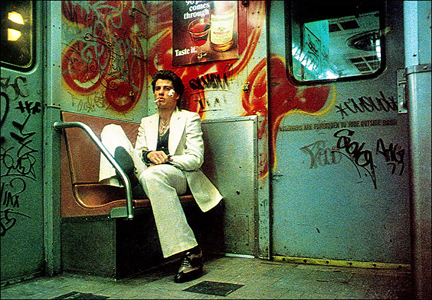The second episode in BBC Four’s series about soundtracks, Sound of Cinema airs tonight. As the person who developed the series and subsequently worked on the episode, Pop Goes the Soundtrack, I thought I’d put together a Spotify playlist of music from the show, and also some of the tunes that got lost along the way.
Our presenter Neil Brand explained the development and subsequent production brilliantly at a screening at the BFI a couple of weeks ago. He likened our approach of basing each programme on a different style of soundtrack music to scooping a cup full of water out of three full baths. The liquid contents remained remarkably fluid throughout the process, until Neil and director Francis Welch finally froze them into the final shape.
A stretched analogy maybe, but one I’ll pull a wee bit further, as the programme itself is in essence about how the soundtrack became ‘cool’ through its appropriation of Jazz, Rock and Pop on the soundtrack.
We begin in the 1950s and the jazz infused New Orlean’s of Alex North’s A Streetcar Named Desire, before moving into the hip Soho nightclubs that John Barry frequented before crystallizing their sound on the pulpy teen flick Beat Girl. We follow the rolling guitar lines of Vic Flick from Beat Girl through to the Doctor No Bond theme, and get hit full in the face by a twin assault of brass and Bassey in Goldfinger.
The Barry circle is closed in the programme by Adele’s Skyfall, but it’s not on Spotify, so I’ve included something that didn’t make the final cut – the brilliant Bond referencing work of Michael Giacchino for Pixar’s The Incredibles.
The sixties also gave us The Beatles, whose films A Hard Day’s Night and Help! were directed by Richard Lester. Though again due to Spotify I’ve included a favourite cover of A Hard Day’s Night by Peggy Lee (what a combo!) The British connection continued to run strong throughout the decade with the amazing Get Carter soundtrack (another one that didn’t make it), and also in the work of two American brothers, Richard and Robert Sherman.
Their work on Mary Poppins was drawn from the British Music Hall tradition – the same stuff that was feeding the imaginations of pop stars like Paul McCartney (on the White Album) and David Bowie. It was an early example of the pop soundtrack drawing on music history to give films a retro, postmodern quality. This is something that reoccurs in the 80s, in David Lynch’s work and again in the 90s thanks to Quentin Tarantino and brilliant music supervisors like Karyn Rachtman.
Perhaps my favourite era in the programme though is the 70s, the decade when New York dominates. We were thrilled to get an audience with Martin Scorsese, who really set the ball rolling with Mean Streets, the soundtrack of which was filled with the sort of music he heard blasting out of tenement windows in his Italian American neighbourhood. It’s a path that leads one of the most successful, and defining movies of the decade, Saturday Night Fever.
It’s easy to dismiss the movie as a slice of kitsch, but it’s anything but – the soundtrack makes sure of that. The mix of Disco classics, pre-existing Bee Gees songs and composer David Shire’s compositions make the nightclub scenes authentically thrilling, while the Philly strings help make the soap opera that goes on outside the club massively melancholic.
Another great soundtrack that didn’t make the final cut (our cup truly ranneth over), was also one of the most revolutionary. Melvin Van Peebles’ proto-Blaxploitation pic, Sweet Sweetback’s Baadasssss Song arrived around the same time as Mean Streets and used music written by Van Peebles and played by red hot new band Earth Wind and Fire.
Realising it’s quality, Melvin released the Baadasssss soundtrack before the film, and used it as a promotional tool – one that ultimately helped turn this unlikely, uncompromising film into one of the hits of the year, even knocking the soupy Love Story off the top spot. It’s a trick that’s been repeated by every pop soundtrack ever since, from the Breakfast Club to Trainspotting.
I’ll forever cherish the moment when Melvin called the office and asked a colleague for ‘a good lookin’ guy called Jake Hayes.’ Now that’s baadasssss.







